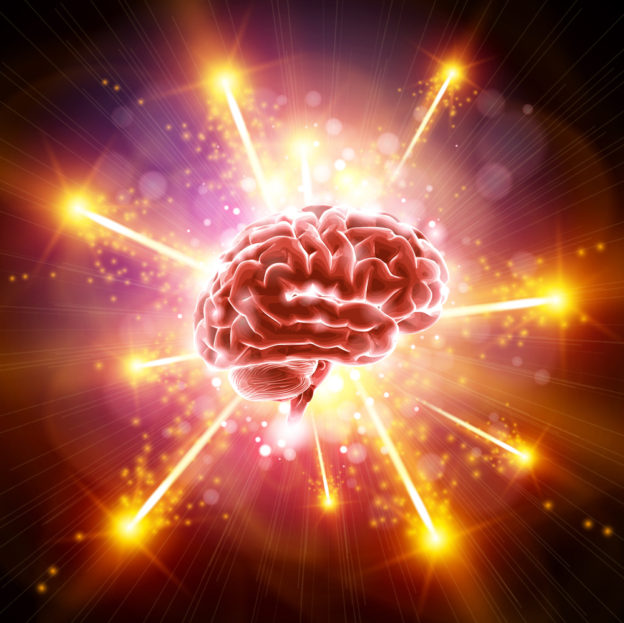By David Blyweiss, M.D., Advanced Natural Wellness
April 28, 2021
Does it feel like you’ve lost a few brain cells over the past 14 months or so?
I mean, life changed a lot when COVID hit. Everyone was stuck indoors. Many people in the workforce started working from home, and many still are. Parks and gyms were closed, right along with everything else. Those of us not working outside the home were told to sequester in our homes, away from friends and family.
So what happened?
People stopped physically interacting with others… stopped seeing and experiencing new things together with others.
When we stop stimulating our brains and moving our bodies, the neural pathways in our brains weaken. And there isn’t enough stimulation to make new connections. Stress just makes it worse. So it all starts piling up and affecting your memory.
You might misplace your phone, glasses or keys more often than normal. It could be hard to remember which day it is or what you were supposed to pick up at the store. Maybe it’s hard to remember names, places or other things that should be on the tip of your tongue.
MD Exposes the Hidden Danger to Your Eyes

When your eyesight starts to fail, it's a real problem. Suddenly you can't go to the grocery store... you can't get to the doctor if you have an emergency... you can't meet your friends for dinner…
Your "regular" doctor doesn't have time to keep up with the latest research. And the same goes for eye doctors. They go to school to learn how to fit you for glasses and contacts, but have no way of preventing the damage and loss of eyesight that threatens your freedom and independence.
Let me show you something that explains a LOT about how your eyes work.
In my FREE Special Report, I'll show you a HUGE, untapped resource for your eyes that safely and naturally restores clear, effortless eyesight.
Click here to get started...
It’s been much worse for people who already have some level of early dementia. An Alzheimer’s Society survey shows nearly half of dementia patients in their survey had more difficulty concentrating, memory loss and agitation during lockdown.
Some of these memory problems might resolve themselves once life gets back to normal – if it ever does.
But there are steps you can take right now to get your brain back in gear.
Top Ways to Boost Your Brain Plasticity
What is brain plasticity? Well, when you strengthen existing neural pathways, it’s called neuroplasticity. It’s what allows neurons to communicate. Of if you’re making new neuronal connections, it’s called structural plasticity. This is basically a way for the brain to repair itself.
And one of the major mediators of plasticity is something called brain derived neurotrophic factor (BDNF). It’s like Miracle Gro for the brain. But it’s not a supplement. You can’t buy it at the store. It’s something your own body makes.
When you’ve got plenty of BDNF, learning new things and retrieving memories are easy. When levels are low, it’s hard to learn anything new and memories can get foggy. And it could lead to dementia.
So how do you tell your body to make more of this brain booster?
Get moving! You can’t make enough BDNF if you aren’t physically active. It’s synthesized by muscle activity. So now that the weather is great and the parks are opened again, get out there and get moving! Play some pickle ball if you can, go swimming, take a walk or ride your bike. Have fun with it.
Upping your BDNF levels with physical activity can help you sleep better too. That’s important, since there’s a link between insomnia and lower BDNF levels.
Are You Suffering From...
- Love handles and a pot belly
- Romance that isn't what it used to
- Forgetfulness and inattention
- Low (or no) strength and endurance
- A sex drive that's shifted into neutral...or worse
If so...you may have Mature Male Burnout. Click here to discover more about this unique condition and what you can do about it.
Sleep opens your brain’s ventricular highway, and through this glymphatic system cerebral spinal fluid rushes in and flushes out all the damaging oxidative stress debris that accumulates in the brain during the day. Sufficient sleep (7 hours) is going to provide a clean wipe and reboot, so your brain is ready and active when you wake up in the morning.
Your brain also needs stimulating mental activity. A new hobby is probably the best thing that older people can do. Learn how to take pictures with all the right lighting, shadows and composition. Learn an instrument or new language. Make new pathways… neurons that wire together fire together!
Don’t do the same thing every day. Take a different way to work. Visit a different part of the city. Chat with different people. Just change things up!
Maximize the Power of Your Brain
There are also some foods and supplements that can help revive your brainpower.
You have to get enough magnesium. What I like is magnesium-threonate because it can increase plasticity and the number of brain connections. And we know it improves cognitive performance, associative memory and spatial memory.
You also want to get enough choline to produce acetylcholine in your brain. You’re going to find it in your egg yolks. That’s why I like those pastured organic chickens and chicken eggs. They have all sorts of great health benefits. Or, if you prefer, you can get supplemental CDP choline or alpha-GPC choline.
B12 is equally important. It helps to protect the myelin sheath. In fact, some people who have been diagnosed erroneously with early onset senile dementia have a B12 deficiency. And when you give them injections of methylcobalamin, within weeks their alleged senile dementia gets better.
Additionally, I like turmeric and curcumin to help improve neural plasticity. They also reduce depressive systems because they’re anti-inflammatory.
And what ‘s the greatest food you can eat to help neuroplasticity?
Eat fish. The omega 3 fatty acids strengthen synaptic activity and boost communication between brain cells. If you don’t like fish, you can always take a fish oil supplement.
These recommendations won’t just help get your brain back in gear after a strange year. They’ll also give you long-term protection from memory problems as you age.
SOURCES:
Read S, et al. Social Isolation and Memory Decline in Later-life. The Journals of Gerontology: Series B. 2020 Feb;75(2):367–376.
Borba E, et al. Brain-Derived Neurotrophic Factor Serum Levels and Hippocampal Volume in Mild Cognitive Impairment and Dementia due to Alzheimer Disease. Dement Geriatr Cogn Disord Extra 2016;6:559-567.
Di Liegro CM, et al. Physical Activity and Brain Health. Genes (Basel). 2019;10(9):720.
Rahmani M, et al. The Brain-Derived Neurotrophic Factor: Missing Link Between Sleep Deprivation, Insomnia, and Depression. Neurochem Res. 2020 Feb;45(2):221-231.
Li, W., Yu, J., Liu, Y. et al. Elevation of brain magnesium prevents synaptic loss and reverses cognitive deficits in Alzheimer’s disease mouse model. Mol Brain. 2014. 7, 65.
Cutuli D. Functional and Structural Benefits Induced by Omega-3 Polyunsaturated Fatty Acids During Aging. Curr Neuropharmacol. 2017;15(4):534-542.







